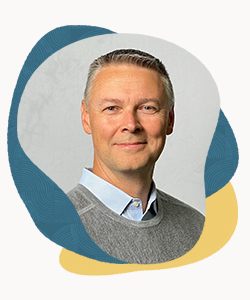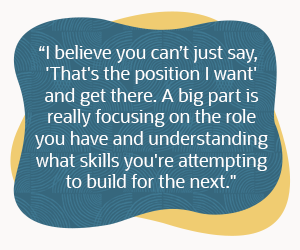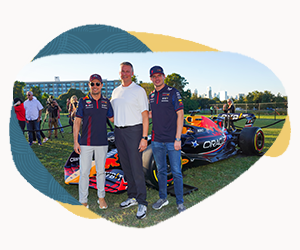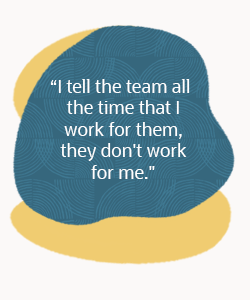Leadership is more than a career destination—it’s a long-term commitment to empowering people, listening to customers, and adapting to change. Managing that change and seizing the opportunities it brings are all part of the executive leadership experience.
In Taking the Lead, we speak to leaders celebrating Oracle anniversaries and ask them to share the lessons they’ve learned along the way.
Mark is interviewed by Senior Director of Executive Leadership Recruiting for the Americas, Justin Abraham. Justin leads a world-class team of executive recruiters exclusively focused on senior-level talent to drive growth and strategy across the enterprise.
Mark Hura has been with us for more than a decade and currently leads our North America Cloud Infrastructure and Technology sales organization. His journey reflects Oracle’s commitment to doing things differently—as well as the power of networking. It started in the most appropriate way possible: by listening to the customer.
 Mark initially joined Oracle in December 2013 as Group Vice President, Sales, Pre-Sales and Partners for the Utilities Global Business Unit. “The business unit at the time had gone out to customers and industry people and asked, ‘Who would be a great candidate to help us accelerate and grow our business?’” he explains.
Mark initially joined Oracle in December 2013 as Group Vice President, Sales, Pre-Sales and Partners for the Utilities Global Business Unit. “The business unit at the time had gone out to customers and industry people and asked, ‘Who would be a great candidate to help us accelerate and grow our business?’” he explains.
“As luck would have it, people recommended me! I thought that was an intuitive way to do things—go, listen to your customers, and identify who can help them succeed.”
Time moves fast
Mark has more than 25 years of experience in developing C-level relationships with customers from independent software vendors to global enterprises and governments. Time moves fast and so does the rate of innovation Mark has witnessed while driving growth in cloud infrastructure.
“I can’t believe it’s been 10 years already. It went by fast and has been an incredible experience.”
His initial surprise at Oracle’s customer-driven approach to discovering executive talent gave way to being impressed by the breadth of our business—and what it meant for his career.
Professional growth
Being a veteran of an energy sector pure player, he questioned if Oracle really understood the industry before joining. His outlook transformed once he fully grasped how deeply Oracle tapped into the customer experience.
“I thought, if we can bring these things together in a much more meaningful way, we could be so much more effective in terms of our ability to engage with customers at a strategic level,” he reflects. “There’s also more here in terms of professional growth than a company that sticks to just one industry.”
It’s been a learning opportunity like no other and Mark seized it from day one with intentional skill-building and role transitions.
“I believe you can’t just say, ‘That’s the position I want’ and get there. A big part is really focusing on the role you have and understanding what skills you’re attempting to build for the next,” he explains.
Scaling up as a leader
“I joined the energy and water business unit and used that to learn more about Oracle and the deep software solutions we had. I had global experience before coming here, so that was a strength that I brought to the company. Then I was able to understand and help build the breadth of our customer approach.”
Scaling up in ability, responsibility, and influence relies on a willingness to seek out greater challenges—and a culture that’s willing to make it happen. That’s what makes a culture where leaders thrive. “I spend a lot of time on culture and developing leaders,” Mark explains. “And Oracle spends a lot of time funding education programs and professional development for aspiring leaders. As you take on more scale, you need to have leaders you trust to deliver the vision.” “I like to let performance speak for itself and drive the development of leaders to bring that up.”
Internal mobility matters
Mark is also involved in recruiting partnerships. To leaders looking to grow their careers at Oracle, he emphasizes the unique portfolio and collaborative culture that attracts individuals, as well as rich internal career mobility opportunities for those already here. “People unfamiliar with Oracle go, ‘Wow, I didn’t know you had all of this. I wish I had this portfolio—I’d be able to do so much better. This gets them really attracted to the opportunity and communicates the culture: We’re collaborative, we’re focused on our customers and their success. That’s what Oracle is about.”
“Internally, people who aspire to leadership—either a new challenge or a larger position—already understand the opportunity. They know what skills they need to bring change.”
“People here are passionate about what they do, know what they’re successful at, and can educate, teach, and mentor others. This is really a unique part of leading within the company. It becomes very rewarding.”
Leading and learning
Reflecting on his own leadership transformation, Mark sees his growth in terms of getting things done. Networking and collaboration are the main tools in any leader’s toolbelt and putting them to work is one of the best ways to keep them sharp. It’s also crucial that leaders never stop learning.
“I’ve learned how to collaborate effectively across different parts of our portfolio.”
“Some people will always say, ‘No, you can’t do that’ to suggestions. I’ve heard it so many times, and many times we’ve ended up creating a new path at Oracle to do just that! People that bring valuable business cases should challenge the status quo because we’re a company that transforms things.”
Critical skills
It’s all part of an open attitude to new business opportunities that keeps things fresh. “If you’re not changing and evolving, you’re falling behind,” Mark explains. Reflecting on desirable traits in leaders, Mark mentions mentorship. “It’s critical from a leadership perspective in that it helps renew the organization,” he observes. But a leader’s skillset can be broader than just one thing. “There are lots of characteristics I look for in a leader: if they can lead by example, with transparency, and have the ability to see opportunities.”
Now and then
Over the years, Mark has seen the evolution of customer engagement at Oracle.
“I engage with customers and spend a lot of time listening to them at executive levels. In many cases, particularly in enterprise or government, past perceptions were that we were very sales- focused. Today, we’re in a completely different place and customer success comes first.” Oracle Cloud Infrastructure’s creation and growth have led to tens of thousands of new customers in addition to a large SaaS portfolio of customers. Meanwhile, Oracle’s global industry units are transforming industry verticals with operational solutions. Long-term relationships between clients, leadership, and teams are key to this success. “The company has completely transformed to better engage customers,” he explains. “We don’t just sell people technology and walk away—that’s not us. We’re their provider of infrastructure and the applications that run their businesses. We are as much a part of customers as their employees.”
focused. Today, we’re in a completely different place and customer success comes first.” Oracle Cloud Infrastructure’s creation and growth have led to tens of thousands of new customers in addition to a large SaaS portfolio of customers. Meanwhile, Oracle’s global industry units are transforming industry verticals with operational solutions. Long-term relationships between clients, leadership, and teams are key to this success. “The company has completely transformed to better engage customers,” he explains. “We don’t just sell people technology and walk away—that’s not us. We’re their provider of infrastructure and the applications that run their businesses. We are as much a part of customers as their employees.”
Taking action
Mark emphasizes the importance of fostering a collaborative culture in his leadership style. “We work together, we win together, and leverage the scale of the portfolio,” he asserts. His leadership philosophy communicates commercial intensity, speed, urgency, and meaningful engagement with customers above all. He underscores the idea of being a vital part of customers’ journeys, going beyond merely providing technology. Put this all together and it adds up to a powerful differentiator he’s not seen harnessed elsewhere. “It means we can bring solutions to our customers that no other single provider can,” he explains. “We create meaningful, impactful relationships so that when you need them to execute and deliver on something, they’re there. Trust is key and we don’t take it for granted.”
Beating the drum
Great teams with the power to influence leadership and collaborate on goals are crucial. It’s a message Mark has returned to time and again to conquer business challenges and it still reaps rewards. After all, no leader can do it all on their own. “I’ve beat this drum for years,” he says. “Leadership culture at Oracle is incredibly collaborative and we ensure that teams are too so customers can benefit.”
“I tell the team all the time that I work for them, they don’t work for me. I’m going to be engaged with them on how to strategize and win against the competition or achieve something difficult. It’s all about collaborating and working for the people, working for our teams.”
Long-term thinking
Mark attributes some of his success to lessons learned from executive leadership. “We’re encouraged to think for the long-term, ensuring customer satisfaction and continued business opportunities.”
“Another lesson is to put the customer at the center and not worrying about what is one team’s responsibility or another team’s responsibility and ensure we’re supporting customers above all.”
The emphasis on patience and understanding the company’s position has been crucial to benefiting customers, the company, and shareholders in the long run. “We’re not going to put the company at risk for business that doesn’t outweigh that risk. That long-term perspective comes into play in making the right decisions.”
As Mark contemplates the future at Oracle, he expresses optimism about the next chapter. “It’s been an incredible 10 years, and I think the best is yet to come. I’m looking forward to being part of helping the company continue to grow.”
Are you ready to lead and learn alongside the most passionate people in tech? Explore our open roles and come create the future with us.
